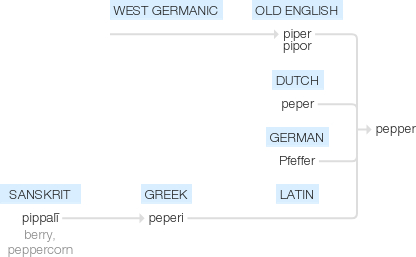Pepper
Old English piper, pipor, of West Germanic origin; related to Dutch peper and German Pfeffer ; via Latin from Greek peperi, from Sanskrit pippalī ‘berry, peppercorn’.
wiktionary
From Middle English peper, piper, from Old English piper, from Proto-West Germanic *piper, from Latin piper, from an Indo-Aryan source; compare Sanskrit पिप्पलि(pippali, “ long pepper”). The name was given to the capsicum fruit because of its unusual spicy taste, not unlike the European spice.
Cognate with Scots pepar, Saterland Frisian Pieper, West Frisian piper, Dutch peper, German Low German Peper, German Pfeffer, Danish peber, Swedish peppar, Icelandic pipar. Doublet of peepul.
etymonline
pepper (n.)
"dried berries of the pepper plant," Middle English peper, from Old English pipor, from an early West Germanic borrowing of Latin piper "pepper," from Greek piperi, probably (via Persian) from Middle Indic pippari, from Sanskrit pippali "long pepper." The Latin word is the source of German Pfeffer, Italian pepe, French poivre, Old Church Slavonic pipru, Lithuanian pipiras, Old Irish piobhar, Welsh pybyr, etc.
Application to fruits of the Capsicum family (unrelated, originally native of tropical America) is from 16c. To have pepper in the nose in Middle English was "to be supercilious or unapproachable."
pepper (v.)
"to sprinkle as with pepper," 1610s, from pepper (n.). Old English had gepipera. Meaning "to pelt with shot, etc.; hit with what pains or annoys" is from 1640s. Related: Peppered; peppering.
